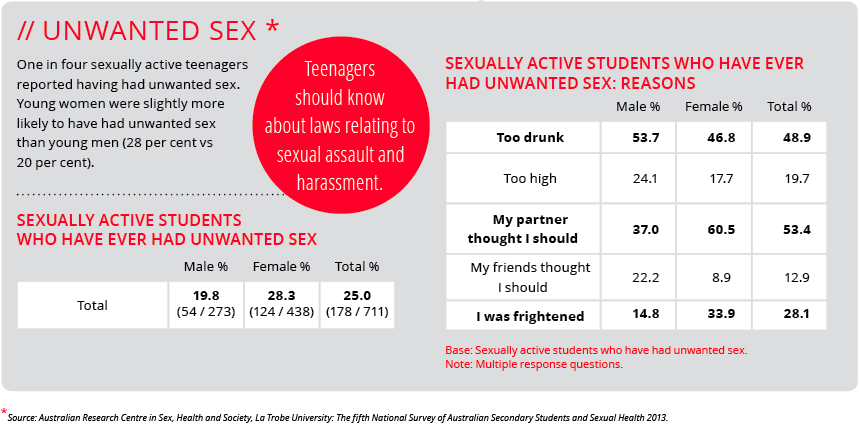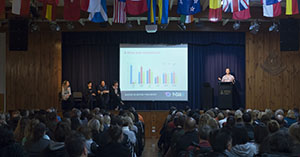
Source: iStock
Victoria’s sexual assault laws cover a range of offences that parents of teenagers should be familiar with. Essentially, forcing someone of any age to take part in any sexual act is an offence. Having sex with someone who is underage is also an offence, but there are some defences available in exceptional circumstances.
Teenagers should know about laws relating to sexual assault and harassment, and that they can talk to their parents and carers if they feel an offence has been committed against them or a friend.
It is important to tell police or employers as soon as possible if you become aware of an offence.
Parents and carers should also ensure that young people know they are never at fault if someone assaults them sexually or sexually harasses them, and that help is available.
Know the law
Being familiar with the law is an important part of keeping young people safe sexually. Parents and their teenagers should know how the law applies to them.
Victoria’s age of consent to sexual interactions is 16. The age of consent for same-sex relationships is the same as it is for heterosexual relationships.
There are some legal defences if the person having consensual sex is younger than 16 and their partner is less than two years older than them and does not have a caring or supervising role with them.
If an adult has a sexual relationship with someone in their care who is 16 or 17, it’s also a crime, unless the adult reasonably believed the younger person was 18 or older.
People aged 18 and over can consent to sex with anyone aged 16 or over, unless they are supervising or caring for the younger person.
In Victoria, criminal laws apply to non-consensual sexual penetration, which includes anything that involves putting a penis into a vagina, anus or mouth (to any extent). It includes putting an object or a part of the body into a vagina or anus.
The law also applies to touching a person in a sexual way, like touching another person’s vagina, penis, anus or breasts. Rape occurs when someone sexually penetrates another person who has not consented, including where the person cannot consent because they are asleep, unconscious or so affected by alcohol or drugs that they cannot consent. Sexual assault occurs when someone touches another person sexually without their consent.

Source: iStock
Sexting
In late 2014, Victoria introduced Australia’s first “sexting” laws. These laws created offences targeting the distribution, or threats to distribute, intimate images of another person, and introduced exceptions to child pornography offences where young people engaging in non-exploitative “sexting” with their peers.
The Crimes Amendment (Sexual Offences and Other Matters) Act 2014 created two summary offences of “distribution of an intimate image” and “threat to distribute an intimate image” in circumstances contrary to community standards of acceptable conduct. These offences apply to young people and adults.
The distribution offence carries a penalty of up to two years in prison, and the new offence of threatening to distribute carries a penalty of up to one year in prison.
New exceptions to child pornography offences will ensure that those aged under 18 are not inappropriately prosecuted or added to the sex offenders’ register for consensual, non-exploitative sexting with their peers. These exceptions do not apply in relation to images depicting a criminal offence such as a sexual assault.
Marriage
Teenagers aged 16 or 17 can marry only if their parents or guardian agree, their partner is at least 18 and a court agrees the situation is special enough to allow the marriage – pregnancy may not be enough.
The court considers things like how long the couple has been together, their maturity, financial situation and how independent they are from their parents. If the court agrees, they must marry within three months.
Contraception
Those under 18 may be able to get contraception, like the pill, from a doctor. The doctor must decide if the young person is mature enough to understand what they’re doing and use the contraception properly. Anyone can buy condoms at any age; most chemists and supermarkets sell them.
Pregnancy
Girls need to know they have options and people they can talk to, such as a counsellor, nurse or doctor. They can choose to keep the baby, adopt it out or have an abortion. There is no legal minimum age for keeping a baby or having an abortion. If the mother is under 16, a loved one concerned about their welfare or the baby can call the Department of Human Services. Abortion is legal in Victoria up to 24 weeks and after 24 weeks in some rare circumstances.
Family Planning Victoria provides advice and support // www.fpv.org.au
Young Fathers
A father is legally responsible for financially supporting their child. If they are at school and don’t earn any money, they may have to pay later when they can afford to. If proven to be the father, they must pay child support until the child is 18.
Rape
A person rapes you if:
- They sexually penetrate you without your consent and do not reasonably believe that you are consenting;
- During sexual penetration, you withdraw consent to sex, but they continue to penetrate you; or
- They make you sexually penetrate (or not stop penetrating) them or another person. It does not matter if the person being penetrated consents to the act.
Sexual penetration means putting any part of the penis into the vagina, anus or mouth. It also means putting any part of an object or another part of the body, for example, finger or tongue, into the vagina or anus of another person. The penetration can be just the tip of the finger or penis and can happen for even a very short time. It does not matter if semen comes out or not.
Consent means the free agreement of your own free will.
Under the law you are not consenting if penetration happens:
- Because you were physically forced to do it or you feared someone else would be forced;
- Because you were scared of what might happen to you or someone else; or
- Because you were unlawfully detained (held), for example, locked in a house or car.
Under the law you also cannot consent if you:
- Are asleep, unconscious or so affected by alcohol or drugs that you cannot freely agree;
- Are not able to understand the sexual nature of the act; or
- Mistake the sexual nature of the act or think the person is someone else.
If you do not consent to sex, it is rape whatever the relationship between you and the other person. A man can be guilty of raping his wife or girlfriend.
Indecent assault
Indecent assault covers sexual acts other than sexual penetration, such as touching your breasts or bottom without your agreement.
Incest
Incest happens when an act of sexual penetration is done with a close relative, for example, a father, stepfather, grandfather or brother.
Sexual offences against children
These are offences that are committed against young people under 18. They include:
- Sexual penetration of a child under the age of 16;
- Indecent act with a child under the age of 16;
- Persistent sexual abuse of a child under the age of 16;
- Sexual penetration or an indecent act with a child aged 16 or 17 by an adult who cares for, supervises or has authority over the child. This may include a teacher, employer, foster parent, sports coach and other roles;
- Procuring a child under 16 for sexual penetration or an indecent act by an adult;
- Procuring a child aged 16 or 17 for sexual penetration or an indecent act by an adult who cares for, supervises or has authority over that child;
- Grooming a child for sexual conduct; or
- Producing child pornography or procuring a child to be involved in child pornography.
A person may not have broken the law if the child consented and:
- They had reasonable grounds (reasons) for believing the child was older than 16 (or 18 where the offence involves a child aged 16 or 17);
- The accused was no more than two years older than the child; or
- The accused had reasonable grounds to believe they were married to the child.
For more information visit // www.legalaid.vic.gov.au

Source: Parent Guides Sex 101
What is sexual harassment?
Sexual harassment is when someone behaves in a sexual way that offends, humiliates or intimidates you. It can include things like:
- Telling dirty jokes;
- Staring and leering;
- Someone making comments about another person’s sexual behaviour;
- Offensive pictures, emails or text messages;
- Someone touching, pinching or brushing up against another person unnecessarily; or
- Someone kissing or hugging another person when they didn’t say yes to it.
It’s also sexual harassment if you agree to someone behaving sexually towards you because you were scared or pushed into it. Sexual harassment is against the law, and if the person’s behaviour is serious then the police could charge that person with a criminal offence.

Source: Parent Guides Sex 101



